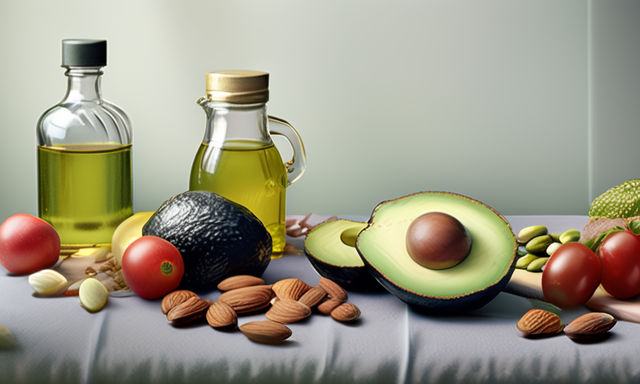10 Healthy Fat Examples Video
For decades, fats were vilified, deemed the culprit behind weight gain and heart diseases, leading many to adopt low-fat diets in the pursuit of health. However, recent nutritional science has shed light on the critical role that healthy fats play in our diet, debunking the myth that all fats are harmful. Healthy fats, particularly unsaturated fats, are essential for numerous bodily functions and can actually contribute to a balanced diet and overall well-being. This article explores the importance of incorporating healthy fats into your diet, the different types of fats, and how they can positively impact your health.
Unraveling the Fat Myth
The myth that "all fats are bad" has been debunked by numerous scientific studies. In reality, fats are a heterogeneous group of compounds, some of which are vital for our health. They provide energy, support cell growth, protect our organs, and help absorb nutrients. The key lies in differentiating between beneficial fats and those that can harm our health when consumed in excess.
Types of Healthy Fats
Understanding the different types of fats can help you make informed dietary choices:
1. Monounsaturated Fats (MUFAs)
MUFAs are found in olive oil, avocados, nuts like almonds and cashews, and seeds. They're known for their heart-healthy properties, including the ability to lower bad cholesterol (LDL) levels while increasing good cholesterol (HDL), reducing the risk of heart disease and stroke.
2. Polyunsaturated Fats (PUFAs)
PUFAs, including omega-3 and omega-6 fatty acids, are essential fats that the body cannot produce on its own. Omega-3s, found in fatty fish like salmon, flaxseeds, and walnuts, are particularly beneficial for heart health, reducing inflammation, and supporting brain function. Omega-6s, found in vegetable oils and nuts, also play a role in brain function and bone health.
3. Omega-3 Fatty Acids
A subcategory of PUFAs, omega-3 fatty acids, are especially noteworthy for their extensive health benefits. They're linked to reduced inflammation, lower risk of heart disease, and support for mental health. Incorporating omega-3-rich foods like fatty fish, chia seeds, and hemp seeds into your diet is highly recommended.
The Role of Healthy Fats
Fats are a fundamental macronutrient, essential for various bodily functions:
- - Energy Production: Fats are a concentrated source of energy, providing more than double the energy per gram compared to carbohydrates and proteins.
- - Cell Structure and Function: Fats contribute to the structure of cell membranes, influencing cell integrity and communication.
- - Absorption of Fat-Soluble Vitamins: Vitamins A, D, E, and K are fat-soluble, meaning they require fat for their absorption and utilization in the body.
- - Hormone Production: Certain fats are precursors to hormones, playing a crucial role in regulating metabolism, immune function, and overall homeostasis.
Sources of Healthy Fats
To reap the benefits of healthy fats, consider incorporating the following foods into your diet:
- - Avocados: Rich in monounsaturated fats, fiber, and various essential nutrients.
- - Nuts and Seeds: Almonds, walnuts, flaxseeds, and chia seeds offer a mix of monounsaturated and polyunsaturated fats, along with protein and fiber.
- - Olive Oil: A staple in Mediterranean diets, olive oil is high in monounsaturated fats and antioxidants.
- - Fatty Fish: Salmon, mackerel, and sardines are excellent sources of omega-3 fatty acids.
- - Dark Chocolate: In moderation, dark chocolate can be a source of antioxidants and healthy fats.
- - Whole Eggs: Often misunderstood, whole eggs are a nutritious source of protein and healthy fats, including omega-3s, particularly in pasture-raised eggs.
- - Peanut Butter: A great source of monounsaturated fats and protein, natural peanut butter (without added sugars or oils) can be a healthy addition to a balanced diet.

Fats to Limit or Avoid
While healthy fats are beneficial, it's crucial to limit intake of unhealthy fats, which include:
-
- Saturated Fats: Typically found in animal products and certain oils, saturated fats should be consumed in moderation. High intake is linked to increased levels of harmful LDL cholesterol and a higher risk of heart disease.
-
- Trans Fats: Often found in processed foods, baked goods, and some margarines, trans fats are associated with increased risk of heart disease and should be avoided as much as possible.
A Note on Moderation
While healthy fats are beneficial, they are also high in calories. Moderation is key to maintaining a balanced diet and supporting overall health. Aim to replace saturated and trans fats (found in processed and fried foods) with healthier alternatives rather than simply adding more fat to your diet.
Conclusion
Healthy fats are an indispensable part of a balanced diet, offering numerous health benefits from cardiovascular support to improved cognitive function. By understanding the different types of fats and making conscious choices to include more healthy fats in your meals, you can enhance your diet's nutritional quality and contribute to your long-term health and wellness.
Disclaimer: This blog post is for informational purposes only and does not constitute medical advice. Always consult with a healthcare professional or a registered dietitian before making significant changes to your diet, especially if you have specific health conditions or dietary needs.
Ready to level-up?
Create meal plans 10x faster, follow up with your clients through our mobile app, and never struggle with meal planning or recipe management again.